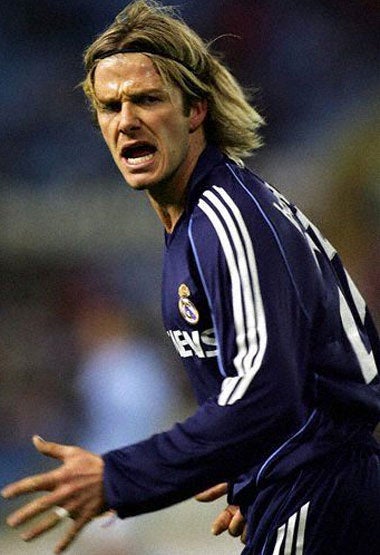Why Beckham and branding are key to Real's world domination

Sanchez, who is responsible, along with the club president, Florentino Perez, for making Real the most profitable club in world football, said that success, in his line of business, was a science. "You keep to certain basic principles and if you have a good brand - and Real Madrid is the best brand in sport - you'll do well." To be successful in football, on the other hand, science - logic, reason -- only got you part of the way, said Sanchez, stating what we all know to be self-evidently, infuriatingly, captivatingly true.
That conversation took place at the end of the 2003-2004 season, when Real's spectacular galaxy of players - Ronaldo, Zinedine Zidane, Luis Figo, Roberto Carlos, Raul, and David Beckham - were in the middle of one of the most remarkable implosions in the history of world football. Halfway through March they were leading La Liga by seven points, they were in the final of the Spanish Cup and had just knocked Bayern Munich out of the Champions' League. Then they lost the Spanish cup final, they lost to Monaco in the Champions' League quarter-finals and lost game after game after game in La Liga, ending up fourth in the table. Meanwhile, Sanchez was signing record-breaking sponsorship deals with major multinationals, filling the Bernabeu coffers which had been empty when Perez and he arrived in the summer of 2000.
Manchester United were the benchmark back then. For Perez and Sanchez they were, explicitly, the team to beat. Today Real, who have not won a trophy in two and a half years, are making nearly three times more from marketing than United.
The reasons for Real's commercial success are complex, and worthy of specialised study. (Harvard Business School has, in fact, produced a paper on the subject.) But if you had to identify one factor that summed it all up it would have to be contained in two of the world's most famous words: David Beckham.
It is not just that the England captain has been the magnet for a lot of big Real bucks, it is the philosophy his signing entailed - a philosophy whose commercial value Real understood and United (under Peter Kenyon) manifestly did not.
It has all to do with grasping the concept of the brand, with knowing that if you possess a name which is not only famous but elicits positive associations in people you can make a lot of money with it; you can sell it to big rich companies who believe they will boost sales if they identify the brand name with their products in consumers' minds.
Real Madrid is a hugely powerful brand - for which the likes of Siemens, Audi, and adidas have paid fortunes -- because three-quarters of the world knows it and because it triggers associations in people's minds that have to do with notions of elegance, class, power and success. What Sanchez and Perez understood was that Beckham (like Ronaldo and Zidane) is also a hugely powerful brand. Big box-office. They saw that to fuse Beckham with Real would add enormously to the value of their brand. That they would be able to negotiate far bigger sponsorship deals if Beckham wore the famous white shirt.
That was why when United's then chief executive, Peter Kenyon, agreed to sell Beckham for £20m (or in fact less), the Real director negotiating with him, Sanchez, simply could not believe his luck. The word that kept ringing inside Sanchez's stupefied mind was peanuts - "Peanuts! Peanuts! Peanuts!" He had gone into the meeting with Kenyon prepared to pay double the agreed amount if need be. In a conversation Sanchez had with Perez in the middle of the negotiation (if that is the word), Perez asked him how much Beckham was worth to him. "Five hundred million euro," Sanchez shot back.
Sure enough, the fusion of the two brands has translated into massive sponsorship money for Real - even as United's income from the big multinationals has, relatively speaking, dwindled. As for shirt sales, it is what people always talk about when they are discussing Beckham the marketing phenomenon. Yet the money he brings in from shirts is significant more as a barometer of the value he brings to the club rather than the sales per se, which are a small percentage of income. In the first six months that Beckham was at Real, from the summer of 2003 to Christmas, he sold more shirts than the rest of the team put together, and twice the number of shirts that Real had sold in the equivalent period a year earlier.
It was by a similar margin that the price of doing business with Real rose for companies like Siemens and adidas.
The problem Real have now is that they do need to start winning again, as does Beckham, otherwise their brand values may start to diminish, and the next time they sit around a negotiating table with a multinational they may have to settle for £30m or £40m less. The problem there, in turn, is that, as Sanchez says, there is no such thing as a cast-iron winning formula. Now Real are doing better on the pitch than they have in two years. Their fortunes changed when a complete unknown, Juan Ramon Lopez Caro, took over as coach in December. No one has a clue why.
John Carlin's anatomy of a season at Real Madrid, "White Angels", is published by Bloomsbury, £16.99 in hardback, £8.99 in paperback
Subscribe to Independent Premium to bookmark this article
Want to bookmark your favourite articles and stories to read or reference later? Start your Independent Premium subscription today.

Join our commenting forum
Join thought-provoking conversations, follow other Independent readers and see their replies